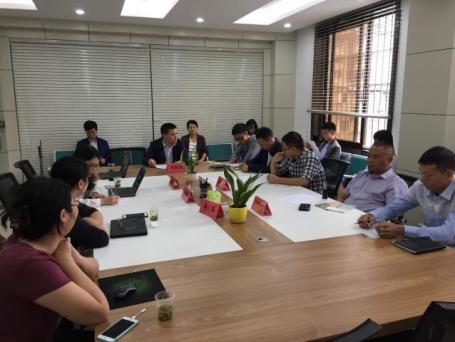WRI hosts Training Workshop on Low-Carbon Transport Development in Guiyang

On September 20, supported by the Children's Investment Fund Foundation and the Hewlett Foundation, WRI hosted a training workshop on low-carbon transport development in Guiyang, aiming at helping local government in Guiyang improve the capacity of drafting low-carbon transport policies and supporting sustainable and low-carbon transport development in the city. WRI researchers XUE Lulu, JIANG Xiaoqian and QIU Shiyong made presentations with the focus on transit route and network optimization, transport-related carbon emission inventory and early peak analysis, and urban transport demand management (TDM) polices research respectively. Over ten technicians from Guiyang Transport Research Center affiliated to Guiyang Municipal Transportation Commission and Guiyang Traffic Information and Emergency Response Center under the Transportation Department of Guizhou Province attended the training workshop.
In June 2016, WRI and Guiyang Transportation Commission signed the MOU to jointly promote the Transit Metropolis program in Guiyang. Under the MOU, the two parties will carry out not only a range of pilot programs to enhance urban transit development but also relevant capacity-building activities. The training workshop, as a major part of capacity building, mainly focused on the barriers to implementing low-carbon transport policies in Guiyang, and provided technical support for Guiyang to build a transit metropolis and develop TDM policies.
At the training workshop, XUE Lulu, WRI researcher for China Sustainable Cities and Transport Program, summarized and shared methodologies on bus route and network optimization and bus station planning and design in the city, based on a number of domestic and foreign cases and rich project experience. She stressed that upgrading bus system requires optimization of comprehensive management, infrastructure and operation, and she outlined major targets of bus system planning in three aspects, namely, bus passengers, operators and government. Based on specific cases, including bus network planning in Suzhou, bus network optimization in Chongqing, bus route adjustment in Shanghai, intelligent bus application platform in Zhengzhou and international public transport priority measures, XUE Lulu also introduced various bus route and network structures and bus route adjustment procedures, and explained bus station planning rules and renovation measures.
QIU Shiyong, WRI researcher for China Sustainable Cities and Transport Program, introduced the policymaking process of urban TDM policies. She pointed out that TDM policies will become an effective tool for urban transport management. Governments need to identify travel structure optimization as the primary goal of TDM. Building on the existing TDM policies and policy implementation analysis in China, QIU Shiyong raised six principles in drafting TDM policies, explained the policymaking process and complementary measures, and offered advice for Guiyang to implement TMD policies.
JIANG Xiaoqian, WRI researcher for China Climate Program, introduced the methodology of transport-related carbon emission inventory and early peak analysis. Citing the Wuhan project as an example, she provided guidance for Guiyang on how to analyze drivers of early peak and build a pathway to peak carbon emission in the transport sector. According to her, travel demand, transport structure, energy efficiency and energy structure are four major drivers of transport-related carbon emissions, and measures need to be taken in the four aspects. JIANG Xiaoqian also introduced emission reduction potential and cost-benefit of various policies, which will inform Guiyang in designing transport emission reduction policies.
WRI also had in-depth discussions with technicians present at the workshop, and explored specific needs of and barriers to implementing transport-related emission reduction policies so as to help Guiyang better develop low-carbon transport. LIU Panlong, Director of Guiyang Transit Metropolis Office, spoke highly of the WRI training workshop.
WRI is always committed to assisting cities in China and other emerging economies in developing sustainable transport. Building on the experience it has accumulated from projects in Beijing, Suzhou, Kunming, Guiyang and Zhuzhou, WRI will continue to host capacity-building activities, promote exchanges among cities and support urban sustainable and low-carbon transport development.